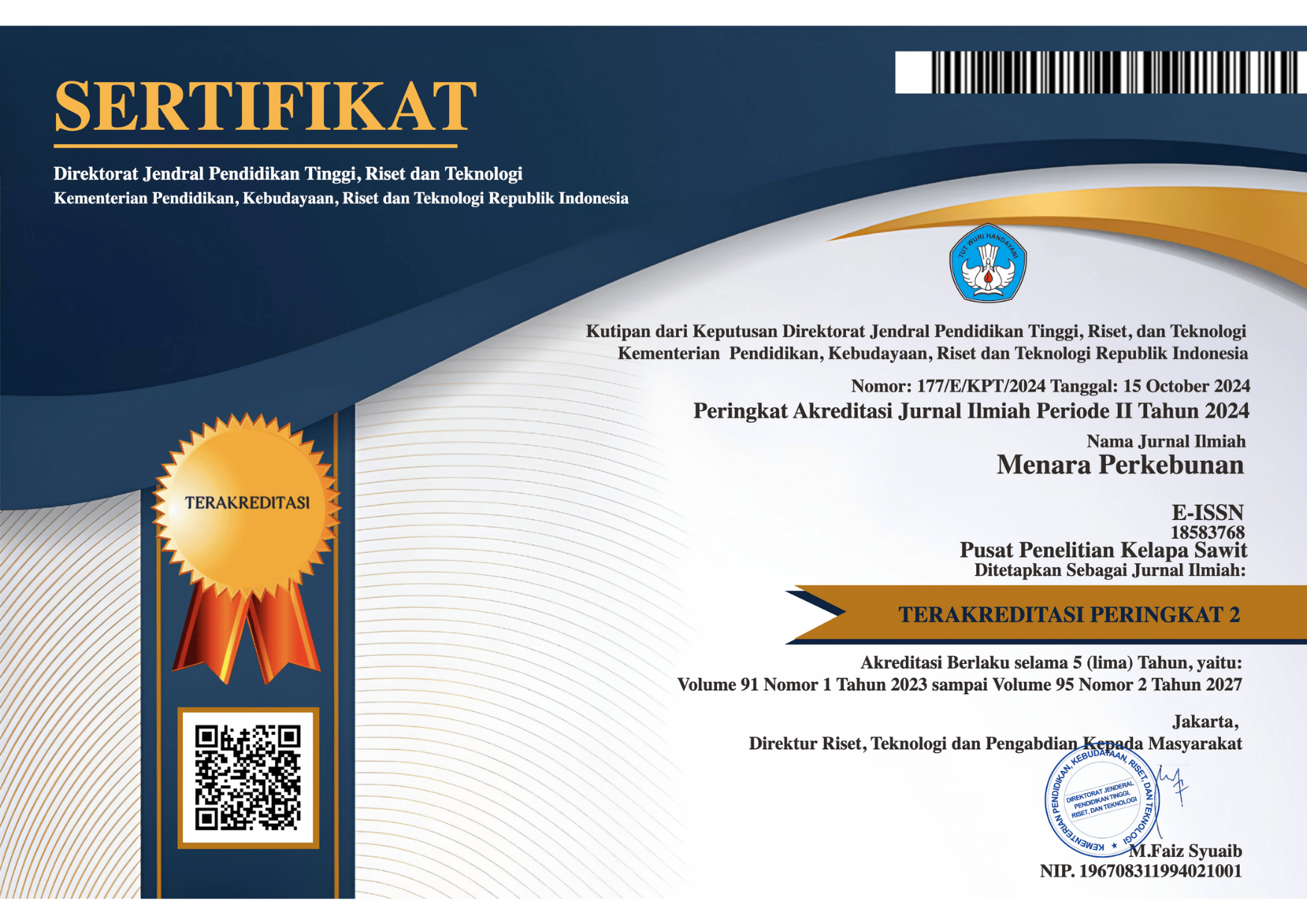Dinamika populasi Trichoderma harzianum DT38 pada campuran arang hayati tandan kosong kelapa sawit (TKKS) dan gambut Population dinamic of Trichoderma harzianum DT38 on mixture of empty fruit bunches of oil palm (EFBOP) biochar and peat
DOI:
https://doi.org/10.22302/iribb.jur.mp.v80i1.45Keywords:
Trichoderma harzianum, biochar, EFBOP, biofertilizerAbstract
Abstract
Biochar offers option for managing land as a source of carbon and soil conditioner. The ability of biochar in increasing soil fertility associates with its ability to retain water, reduce soil acidity, and keep the availability of essential nutrients for plant thus increasing crop produc-tivity, and reducing the risk of soil erosion. Biochar is also substance to provide a suitable environment for the growth of beneficial microbes, including an isolate of Trichoderma harzianum used in this study, that has been proven capable in stimulating plant growth and suppressing soil borne diseases. The purpose of this research was to determine the in vitro compatibility of T. harzianum DT38, Indonesia Biotech-nology Research Institute for Estate Crop (IBRIEC) collection, in mixtures of EFBPO biochar and peat during 28 days. This research was performed in completely randomized design with single factor, comprising of five formulas: 1) 100% EFBOP biochar (K1), 2) 100% peat (K2), 3) Mixture of EFBOP biochar and peat = 1 : 4 (F1), 4) Mixture of EFBOP biochar and peat= 1 : 8 (F2), dan 5) Mixture of EFBOP biochar and peat= 1 : 12 (F3). The colony forming units were determined after storage to express the amount of fungal propaguls in each mixture. The results was analized using one-way ANOVA test and Duncan Test. Result showed that the total of T. harzianum DT38 propaguls was not significantly difference among five mixture preparations tested during 0 and 7 days storage. The total propaguls were insignificantly difference between F1 and K2, and also between F2 and F3in 14, 21 and 28 days incubation. Peat addition on biochar increased the total of T. harzianum DT38 propaguls during 28 days incubation. The total propaguls which are remain high in F1, F2 and F3 formula up to 28 days storage indicating that the mixtures suitable for microbe media and biofertilizer formula.
Abstrak
Penggunaan arang hayati (biochar) merupakan alternatif pengelolaan tanah terutama sebagai penyedia karbon dan pembenah tanah. Kemampuan biochar dalam meningkatkan kesuburan tanah berhubungan dengan kemampuannya untuk menahan air, mengurangi keasaman tanah, menjaga keter-sediaan nutrien yang penting bagi tanaman sehingga mening-katkan produktivitas tanaman, serta mengurangi resiko erosi tanah. Arang hayati juga berperan dalam menyediakan ling-kungan yang cocok untuk pertumbuhan mikroba, ter-masuk isolat Trichoderma harzianum yang digunakan dalam penelitian ini dan teruji mampu meningkatkan pertumbuhan tanaman dan mengendalikan penyakit tular tanah. Tujuan penelitian ini untuk mengetahui kompatibilitas T. harzianum DT38 koleksi BPBPI pada bahan pembawa berupa campuran biochar tandan kosong kelapa sawit (TKKS) dan gambut selama penyimpanan 28 hari secara in vitro. Penelitian ini menggunakan rancangan acak lengkap (RAL) untuk menguji lima perlakuan, yaitu : 1) 100% biochar TKKS (K1), 2) 100% gambut (K2), 3) Campuran biochar TKKS dan gambut 1 : 4 (F1), 4) Campuran biochar TKKS dan gambut 1 : 8 (F2), dan 5) Campuran biochar TKKS dan gambut 1 : 12 (F3). Hasil pengamatan pada penyimpanan 0 dan 7 hari menunjukkan bahwa jumlah propagul T. harzianum DT38 dari berbagai formula tidak berbeda nyata. Jumlah propagul antara formula F1 dan K2, serta F2 dan F3 tidak berbeda nyata pada penyim-panan 14, 21 dan 28 hari. Penambahan gambut pada biochar TKKS dapat meningkatkan jumlah propagul T. harzianum DT 38 selama penyimpanan 28 hari secara in vitro. Jumlah propagul T. harzianum DT38 pada media F1, F2 dan F3 selama penyimpanan 28 hari masih memenuhi jumlah minimal propagul dalam bahan pembawa yang menunjukkan bahwa media ini sesuai untuk pertumbuhan mikroba dan berpotensi sebagai formula pupuk hayati.
Downloads
Downloads
Submitted
Accepted
Published
How to Cite
Issue
Section
License
Authors retain copyright and grant the journal right of first publication with the work simultaneously licensed under a Creative Commons Attribution License that allows others to share the work with an acknowledgement of the work's authorship and initial publication in this journal.













